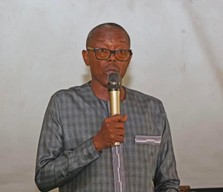By Mahmud Tim Kargbo
Tuesday, 23 September 2025
The Ministry of Lands, Housing and Country Planning has formally published Government Notice No. 371 in the Sierra Leone Gazette, Vol. CLXVI, No. 73, dated Thursday 28 August 2025. Acting under the authority of the Unoccupied Lands Act, Cap 117 (1960) (https://www.sierra-leone.org/Laws/1960-19.pdf), the Ministry has moved to recover unutilised tracts of land along the Newton and Songo corridor and its environs. Individuals or organisations claiming ownership of these parcels have been directed to submit supporting documents to the Deputy Director of Surveys and Lands, Mr Abraham Cooper, between 1 September 2025 and 28 February 2026. Submissions will be receipted officially, and claimants are to liaise solely with Mr Cooper to avoid duplication or dispute.


The Gazette notice includes the Newton and Songo Colony and Environs Boundary Schedule (Plot 1), Schedule Block 1, which contains full technical details such as beacon references, distances, and GPS coordinates that precisely outline the affected land. The full text is available at the Government Printing Press, 14 Howe Street, Freetown.
Communities Listed
According to the Gazette, 47 communities are within the boundaries mapped out for this exercise. They include:
Kallie Town, Brama, Newton, Madonkeh, Rogbom, Mamango, Maba, Masoko, Mayembana, Robis, Maseleh, Makonkodeh, Masella, Konta, Kwama, Rogere, Gbonkowaylay, Mafullah, Fabaina, Mahena, Ngarahun, Malamana, Masorie, Robonga, Rokundoh, Maselor, Magbagba, Mapoponi, Songo Loko, Mabala, Crossing, Foya, Masita, Makrifoh, Mabatama, Makolbondo, Magbaft, 5-Mile, 6-Mile, Katu Town, Kporbu, Gbowela, Maswaray, Gbovenhum, Makono, Mapakira, and Magbanamaty.
Note: Villages and towns with over twelve years of uninterrupted occupation are exempt, as provided under Cap 117.
Schedule Breakdown
· Schedule One: 25,000 hectares in Newton and Songo, coordinates published in the Gazette.
· Schedule Two: Adjacent plots, also carefully documented.
President Julius Maada Bio has reiterated his administration’s commitment to executing repossession strictly under the law, safeguarding citizens’ rights, while ensuring the State’s authority is upheld. This action reflects the government’s wider “Big Five” reform agenda aimed at instilling order and strengthening governance.
The Truth and Reconciliation Commission previously identified mismanagement of land, poor enforcement, and impunity as major grievances fueling public distrust. The current exercise directly addresses those findings by restoring State control and promoting fairness through legal means.
Legal Background
The law defines land as unoccupied if not lawfully held. Where occupation cannot be proven by twelve years of continuous use through building, farming, water storage, or industrial activity, repossession is automatic. Source:
https://www.sierra-leone.org/Laws/1960-19.pdf
Claim Period
Claimants have from 1 September 2025 to 28 February 2026 to present evidence. Each submission will be logged and issued with a unique receipt for transparency.
Those with long-term but undocumented tenure will be accommodated through State Land Grants, rather than Leases, to regularise their ownership. Documents signed by Headmen are invalid under the 2019 Miatta Conference Agreement, where Headmen confirmed they lack legal authority to issue land papers.
Verification Through Technology
Decades of satellite images will be used to confirm claims. “Satellite data allows us to verify year by year. All claims will be assessed rigorously,” stated Tamba Sahr Dauda, Acting Professional Head and Director of Surveys and Lands. “If we can prove that you have occupied land for more than twelve years, you will keep it. We are acting entirely within the law.”
After February 2026
Once the deadline passes, unclaimed land will be registered as State Land. Occupiers without authorisation will face prosecution, with penalties ranging from fines to imprisonment. The Sierra Leone Police and the Attorney General’s Office will enforce the law.
Historical Perspective
The Unoccupied Lands Act, rooted in colonial legislation, has long governed the distinction between Crown Lands and Communal Lands. Today, its enforcement is seen as vital to preserving public resources.
Dr Mariama Conteh, land tenure researcher, remarked:
“Although the law originates from colonial times, its enforcement today is indispensable. By repossessing unoccupied land, the government is safeguarding the people’s inheritance and strengthening the rule of law.”
Wider Implications
Disputes over land have consistently caused tension, especially in the rapidly expanding Western Area. By enforcing the Act, the government seeks to protect public lands, prevent fraud, and secure space for development.
Minister Turad Senesie emphasised: “Legitimate claimants are protected, but all unoccupied land must revert to the State for the benefit of the people.”
Quick Points
· Unoccupied Lands Act enacted in 1960.
· Defines land “not in lawful occupation.”
· Twelve years’ continuous use protects ownership.
· Six-month notice required before repossession.
· Unclaimed land becomes State property.